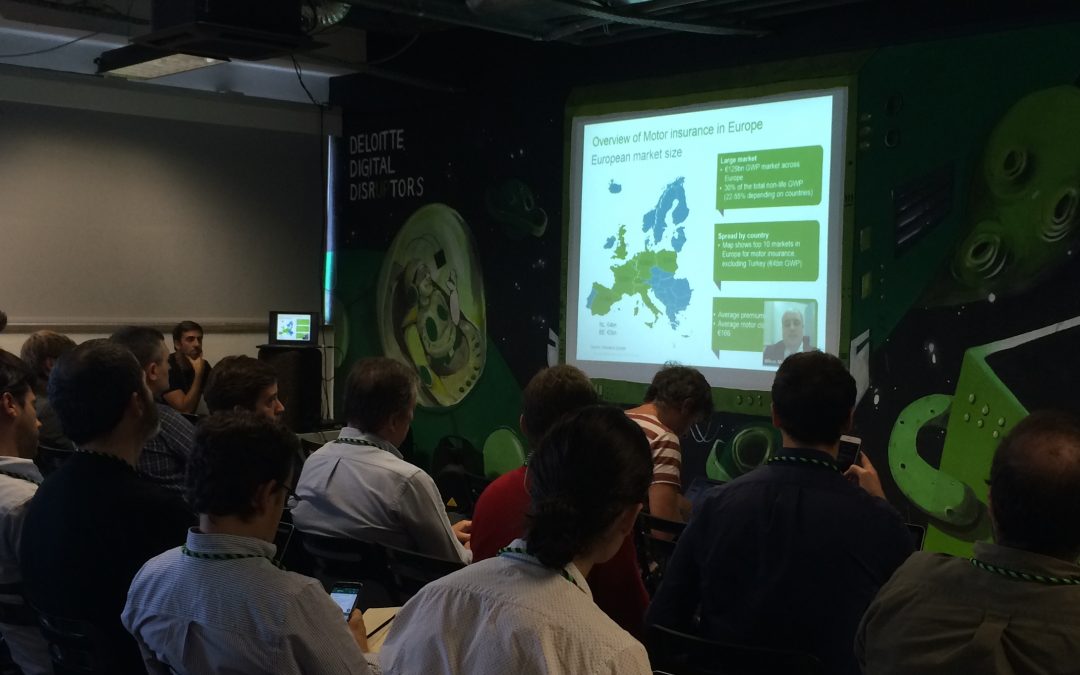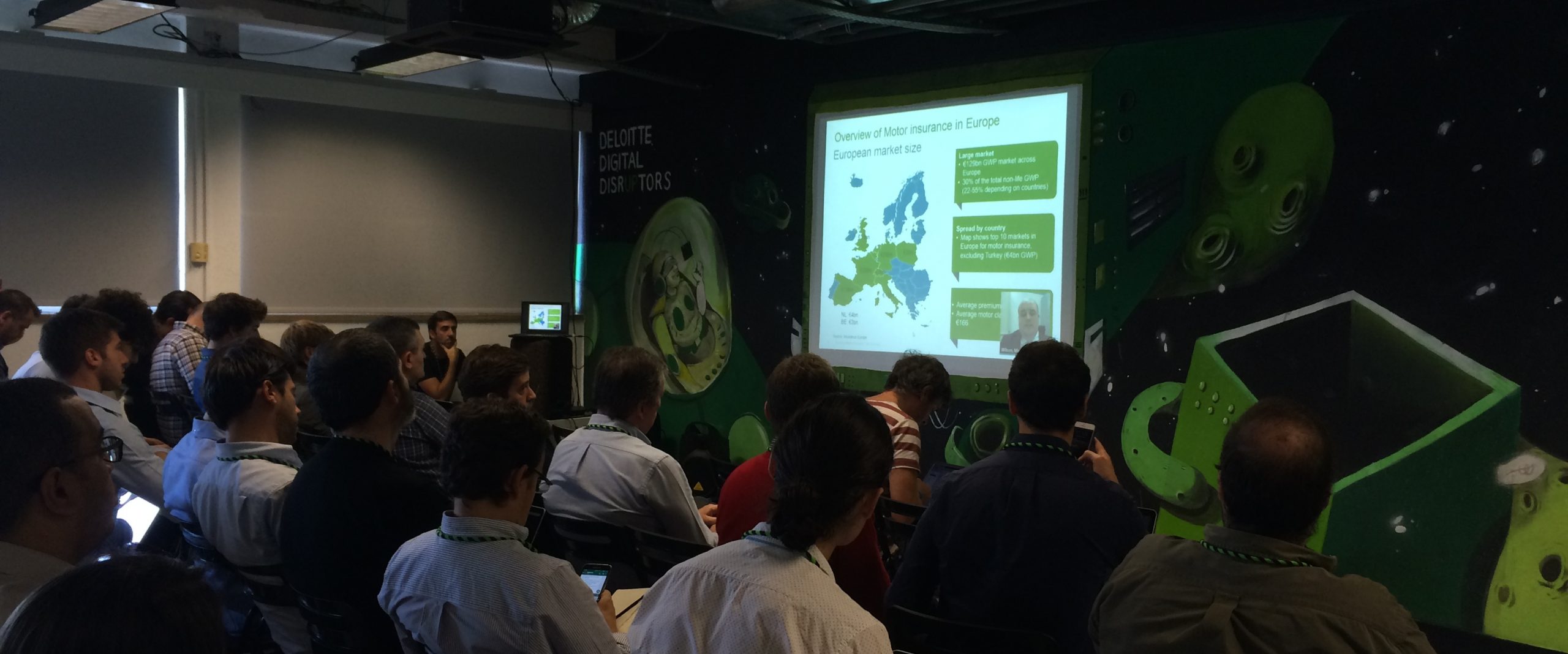
by maria | Oct 28, 2015 | Uncategorized

So, the whole world is wondering… What are the future trends in tech? Is the startup you’re building going to disrupt today’s conventionalities and change the world as we know it? Will you get invested because you’re a visionaire or will you fail because you couldn’t keep up with the new trends?
Truth is, very few people can answer these questions for you. But, there’s something we can do to help.
During the past few years at Beta-i, we’ve been working closely with startups and innovation so, we know a thing or two on this matter. We’ve been reading carefully several articles and reports, we’ve interviewed many startup founders, talked to investors and VCs and did our own research to find out what are the future trends in tech. In the end, it all comes down to betting in the right industry and providing a solution for a large market. If you’re wondering where to place your bets, check out this out:
1. Big Data / Machine Learning
We’ve said it before. Big data and machine learning are definitely worth betting in. According to the American VC, Andreessen Horowitz, “machine learning is to big data as human learning is to life experience: We interpolate and extrapolate from past experiences to deal with unfamiliar situations.” Therefore, machine learning can duplicate this behaviour at massive scales. It can help predict behaviours and change the way we do business. For example, imagine that you’ve built a platform for sports to help people keep track of their progress. In a year, you’ll have large amounts of data that you can use to predict the behaviour of your users. So, in the end you can improve your product and let the machine learn the patterns in the data and get you more insights.
2. Digital Health
Every day we see more and more solutions built for the healthcare industry. Why? Because we need technology to make it more efficient and accurate. Imagine if you could get a diagnosis through a mobile app? Well, it will most likely happen in the future. Again, the healthcare industry can work with big data and machine learning to change the future of healthcare and literally save lives. You can work with hospitals, doctors, patients, insurance companies and many others. There’s countless opportunities in this industry and you should watch it closely.
3. Security
We all worry about the private data stored in the cloud and on our mobile phones, right? Well, now imagine how companies worry about that too. The fear of being hacked is constant so the need for protection emerges. How can you stop a hacker from breaching in and how can stop a hacker that already breached in? Well, here’s a clear opportunity for those who are willing to do something in security.
4. Insurance
Insurance is all about risk. And, during the past few years, new technologies have been able to change the way insurance companies price risk. You have several gadgets and mobile apps to help insurance companies understand that certain customers should definitely pay less, because they drive carefully in safe neighbourhoods, while others should pay more, because they drive recklessly in dangerous roads. Another important thing is that insurance companies can nowadays interact in the different way with their customers and provide better solutions. Imagine if your car insurance company can guide you through safer roads and prevent accidents, or your home insurance company could detect water on the floor and call for a plumber. It’s a win win situation: insurance companies end up providing a better service to customers, and they also decrease their costs because they prevent more accidents and damages. And if you’re building a solution that can be used by insurance companies, from big data to Internet of Things, we should definitely talk…
5. Internet of Things
Internet of Things is fun. Imagine if your fridge could tell you that you were running out of milk and send you a push notification when you’re on your way home so that you have time to drop by the supermarket before heading back home? Wouldn’t that be cool? Well, this is the Internet of Things. You can find many other examples like this. LoT is definitely growing and we’ve seen it across many of our startup programs.
Hopefully, narrowing down the future trends will help get on the right track and realise there are many opportunities out there. If you’re into any of these areas, let us know, we might be able to help by providing you the right mentorship, skills, tools and help you reach top clients in the insurance industry for example. Applications for our accelerator, Deloitte Digital Disruptors, are open until October the 7th.
Have anything to add to this article? Then, drop us a comment below.
The post 5 Top Trends in Tech for 2016 appeared first on Deloitte Digital Disruptors.

by maria | Oct 21, 2015 | Uncategorized

We’re going UP and we’re taking 25 disruptive startups with us. Prepare for take-off and get to know the projects that are joining Deloitte Digital Disruptors for the first phase of our accelerator. Let’s transform tomorrow’s insurance.
Join our Hackathon this weekend and help these startups solve intriguing tech challenges, and get the chance to win a UDI drone or a tablet from Wacom. Register here.
DreamQuark
DreamQuark is a startup that develops cognitive technologies healthcare and insurance, creating value out of their data stocks. They develop new tools around cognitive and deep-learning technologies to help customers create new products and services for prevention, diagnostic and care.
Zen We Share
ZenWeShare has developed an automotive insurance scoring algorithm based on e-reputation data. What they are able to do is to compute a driving quality scoring based solely on a person’s Facebook profile.
idatase
Starting from a profound understanding of the infrastructural foundation idatase uses an innovative and always up-to-date view on efficient real time or buffered pre-processing of massive amounts of data. Through an inherent in-depth analysis of technology, economy, society or business oriented interactions and structures, they are able to create a better understanding of ongoing processes.
Kinetikos
Kineticos turns your data into clinical insight. They combine the explosion of movement monitoring technology with breakthroughs in computational biomechanics and machine learning to support clinical decision making. In other words, they transform vast information about each patient into treatment knowledge so that you and your doctor take the best medical decisions.
Powr of you
Powr of you is a consumer intelligence tool that connects brands and consumers to learn and earn from their digital footprint. Brands can learn about consumer behavior with a unified view across devices and platforms, driving greater marketing ROI.
Atooma
Atooma is an Internet of Things smart platform as a service. Their goal is to offer a key technology for device vendors that would like to enter the IoT sector without shifting focus from their products or having to reengineer them. Our technology if flexible to a variety of fields as it is horizontal to any type of business.
Whale
Whale has a platform to deliver the best customer experience management on social media. They have the ability to collect unstructured data regarding client’s digital interactions, emails, mentions, complaints, requests, simulations, and create a dynamic client profile for each and every customer or lead. Based on this information they are able to determine each client’s archetype.
Fluo
With Fluo consumers can buy the right insurance at the best price avoiding duplication of covers while business partners (insurers, banks, payment service providers, travel operators) sell more, improve customer satisfaction and provide a solution for new regulations. Fluo’s engine provides a diagnostic on guarantees needed for each situation such as travelling, renting a car or buying goods, then advises users on the right guarantee for each situation and, if needed, recommends buying the missing ones.
Fito
Fito is a platform which fills the gap between health and fitness professionals and their clients, by recording data through wearables and apps. Within the mobile app, users can connect different wearables & apps to their fito account, so that their health/fitness professional can get access to this data and be notified every time there is a new record coming in (running exercise, sleep quality, summarized daily activity, logged food and new glucose reading are some examples).
Scicrop
Scicrop is the S&P and Bloomberg for agriculture. It acquires worldwide data from agriculture, financial markets and climate, mapping the value-added information. It analyzes more than 200k data units per day collected through public and private agrometeorological stations, mapping drones, news, social networks and satellite images.
Ukkobox
Ukkobox has an easy tool that safely encrypts and spreads user files to existing cloud providers worldwide. Because they store only parts of the files on each provider with redundancy, everything is secured and accessible even if some of these providers suffer an outage or are hacked.
WeSavvy
WeSavvy is a Pan-European insurance digital platform that enables insurers, agents/brokers and other financial service providers to engage more effectively with policyholders. Through the combination of Big Data and IoT, WeSavvy brings telematics, effective analytics and innovative risk management to the insurance industry introducing an easy and transparent way for policyholders to gain back control over their insurance premium.
Sensefinity
Sensefinity is the Internet of Things for the masses. In other words it’s for all businesses which have data information needs for additional revenues based upon efficiencies and risk mitigation. By plugging Sensefinity’s devices and registering to the platform, projects can immediately start using data gathered from their assets and delivered by their ubiquitous GSM data-pipe with multinational companies and covering worldwide territory.
RiskAPP
RiskAPP collects, processes and represents risk data for the insurance industry. Their tool, thanks to a proprietary algorithm, is capable of estimating the value of risk in supply chain and in productive systems and express the economic losses that can arise from such risks. Insurers are using this tool to estimate the risk and consult their clients on the best policies to subscribe and they’re also using this tool as an actuarial method to compute premiums for business interruption cover and contingent business interruption.
Botcar
Botcar is an electronic brain to transform old cars in connected cars for less than 100 euros of investment which, unlike other alternatives, works as a platform providing several apps everywhere and anywhere for the B2B market.
Petable
Petable is a preventive health plan management software for veterinary clinics and pet owners that make caring for their pets a priority, bringing them together through a web based back office and a mobile app. Since they integrate vet clinics in this experience it leads to an increased quality of the clinics’ services (being top-of-mind, being part of the pets life while at home), and a 20 % improvement in health plans’ compliance which means more visits and transactions for the clinics.
Data XL
Data XL is the insurance pricing room that allows companies to set up the best profitable price for their customer, using mathematical pricing discrimination techniques. Their approach bears in mind the competitive set offers and the individual characteristics of the customers.
Standard Access
Standard Access has developed a hardware / software product and lock combination that allows monetised time restricted access to a building via your internet enabled device integrated with a client or tenant management platform. This is for property managers to be there when a potential client wants to do a viewing or for a real estate agent or for a maintenance guy to carry out repairs and to stop unauthorized access when keys or card based systems get into the wrong hands.
Glexyz
Glexyz has developed a platform that runs in the cloud to carry out the complete product development cycle using virtual tools, from material selection and manufacturing process parameter selection, to optimisation of part-system-product, and prediction of lifetime performance. Their platform can save the customer 20% to 50% in time and cost development and improve significantly the performance/cost ratio of the product, enabling the product a great advantage in today’s hyper competitive market.
SkenarioLabs
SkenarioLabs is developing a globally applicable service (SaaS), which gives virtually anyone the capability to optimize and understand the most sustainable choices for urban structure in terms of energy efficiency, climate effects and money. Their service exploits standardized calculation methods, open data and various algorithms and automatizes these analyses.
Visualbox
Visualbox is an online B2B communication tool for professionals working in marketing, communication and sales departments of any company. Their goal is to help companies improve communication procedures with their customers, save time, and measure the results.
Infoseg
Infoseg is a software development company that automates the mind mapping technique to visualize complex information. Applications in Banking, Insurance, eHealth and other industries.
Stimul
Stimul is a high-touch intervention program delivered through an online platform that provides everybody with the capacity to build healthy lifestyle habits thanks to human coaching, personalization, tracking and flexibility.
Natural Intelligent Technologies
Natural Intelligent Technologies has the mission to provide state-of-the-art innovative software technologies in the field of Pattern Recognition and Artificial Intelligence. They aim to commercialize the first Italian proprietary software technology able to read, search and analyze handwriting, saving time and money compared to when these tasks are done manually.
Finhorizon
Finhorizon is a startups focussed on performance ratings for appropriate and suitable decisions on financial products. What Finhorizon does is refine financial data to measure risk and estimate returns.
Oh and remember to join us for the first phase of our program: the Hackathon. Join us this weekend if you’re a developer or designer and want to solve interesting challenges. Register here.
The post Meet the 25 startups selected for Deloitte Digital Disruptors appeared first on Deloitte Digital Disruptors.

by maria | Oct 14, 2015 | Uncategorized

So, the selection process for the first edition of Deloitte Digital Disruptors started and 25 startups are already being chosen out of the 160 applications we received from all over the world. We’re soon announcing who these talented guys are and you might get a unique chance of joining them soon after they arrive at Lisbon for the DDD Hackathon, to help them during 48 hours prototyping the services with which they’ll compete to stay in the final 15 startups that will move on to the acceleration program itself.
The 24th-25th October Hackathon is part on of the last selection phase the startups have to go through – the Bootcamp – and it’s also your chance to somehow participate in the first corporate accelerator ever done in Portugal. By opening this event to the entire community, we aim to bring together local entrepreneurially minded designers, developers, business managers and others who are driven to develop themselves through practical experience, to nurture their skills, broaden their network and develop new ideas alongside with our global startups, contributing for their growth.
Having this said, if you want to help building tomorrow’s insurance products and services in 48 hours being a skilled developer, designer, UX expert or just a hackathon fanatic, join the Deloitte’s Hackathon and enjoy the challenging environment, perks and some cool prizes that will be announced during the weekend.
UP for the challenge? Register here and keep an eye on our Hackathon page for more info on the weekend agenda. See you in 10 days!
The post Join the selected 25 startups in 10 days for the DDD Hackathon appeared first on Deloitte Digital Disruptors.

by maria | Sep 4, 2015 | Uncategorized

It seems that the one-line elevator pitch continues to weave itself into every pitch, presentation, conversation and/or casual meetup. There are many that believe we should be able to summarize everything and everyone in one sentence. This is probably due to the fact that we live in a world of instant gratification, are short of time and of course apt at the 140 character status updates or sharing of wisdom.
There is something magical about “15,000 songs in your pocket”, the famous line used to explain to the world what the Apple iPod did. Though its success was more than the explanation, it was incredible to see the simplicity in the message, helping people to instantly understand two important selling points of the iPod – its physical size and its virtual memory. Until then, most potential customers of mp3 players had no idea what MB and GB meant or what it amounted to. “15,000 songs” was easily understood and the message was simple – to all effects, you could now have your entire music collection on this one device that fitted in practically any pocket.
However, somewhere along the line, the startup ecosystem has forced the one-liners into the mix, making it a headache for most founders and some comic relief for innocent bystanders. It should be no surprise that one-liners actually emerged in standup comedy.
In 2013, Chris Eleftheriadis wrote a blog post for Vision Mobile, a leading research company in the app economy, titled “The Art of One-line Pitching: A Study of AngelList”, whereby Chris shares his insights on how startups communicate their value proposition to investors.
One of the greatest challenges today for startups is that they may seem to address one problem, yet they use a variety of cross platform techniques such as mobile, social, e-commerce, media, review systems, etc.
The purpose of the one-liner is to garner immediate interest in what you are about to present. One false move and you might as well be talking to yourself. Get it right and you’ve set the stage complete with an attentive audience. It can be that cut throat.
Understandably, many founders obsess with finding the right combination of words to accurately describe their future resorting to comparisons with established and successful startups – “The AirBnb for students”. Yet many mentors are against this as it shows a lack of originality and may actually taint the pitch or worse, disengage those on the receiving end. Referencing other companies is always a gamble because it piggybacks on already successful companies when the core idea should stand out on its own. Like most of the decisions you will have to take – make it yours and feel comfortable with it.
The study set out to find the most popular companies referenced and their insights are quite revealing. They found more than 60 companies referenced by the 1700 startups in the study, the top 10 accounting for nearly half of all references on AngelList.
Though LinkedIn topped the list, which seems surprising to me as the majority of the startups I come across are B2C and not B2B, you probably won’t be surprised to see Pinterest, eBay, Facebook, Yelp, Instagram, Groupon, Airbnb, Youtube and Amazon on that list. The most interesting part of the study is the 9 types of pitch references.
- The most commonly found references:
– X for Y: Yammer for Education.
– X meets Y: Yelp meets Hipster meets Foursquare:
– The X of Y: The Pinterest of online dating
- Comic, ironic and/or sarcastic:
– Facebook for the dead
– Instagram for basketball junkies
– Think “Netflix for Grandma” + “Help, I’ve fallen and I cant get up”
– Yelp for medical marijuana.
- Though I suspect this is the least effective, it was the third most widely used reference – “we’re doing same thing as them but better”. Though it may play to the comfort of similarity, it’s a huge risk:
– Better than Amazon’s customer experience for any Brand
– LinkedIn on Steroids
– Search engine that beats Kayak.com’s fares by up to 80%.
- In a world of mathematics, this one is for the geeks:
– (Google x Facebook x Amazon) + (Universal Reviews)
– Ebay+Soundcloud
– Instagram + Trips = …
For more examples, check out the post here.
So. Are you ready to get started? If you need help to validate your idea and learn how to ignite your startup you should apply to Beta-Start by September the 13th.
Food for thought from the conclusion of the article:
“With 95% of referenced startups being marketplaces, the mechanisms for creating and capturing value in today’s digital world are governed by what we call ecosystem economics. Today’s innovation lies more in business models than technology.”
The post The One-line Elevator Pitch appeared first on Beta-Start.








